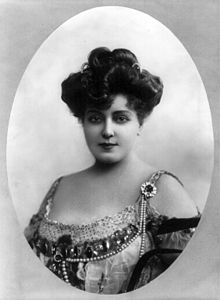Lillian Russell
| Lillian Russell | |
|---|---|

Lillian Russell, 1905
|
|
| Born |
Helen Louise Leonard December 4, 1860 (or 1861) Clinton, Iowa, U.S. |
| Died | June 6, 1922 Pittsburgh, Pennsylvania, U.S. |
| Occupation | Actress, singer |
| Years active | 1879–1919 |
Lillian Russell (December 4, 1860/1861 – June 6, 1922), born Helen Louise Leonard, was an American actress and singer. She became one of the most famous actresses and singers of the late 19th and early 20th centuries, known for her beauty and style, as well as for her voice and stage presence.
Russell was born in Clinton, Iowa but raised in Chicago. Her parents separated when she was eighteen, and she moved to New York with her mother. She began to perform professionally by 1879, singing for Tony Pastor and playing roles in comic opera, including Gilbert and Sullivan works. Composer Edward Solomon created roles in several of his comic operas for her in London. In 1884, they returned to New York and married in 1885, but, in 1886 Solomon was arrested for bigamy. For many years, she was the foremost singer of operettas and musical theatre in the United States, performing continuously through the end of the 19th century.
In 1899, she joined the Weber and Fields' Music Hall, where she starred for five years. After 1904, she began to have vocal difficulties and switched to dramatic roles. She later returned to musical roles in vaudeville, however, finally retiring from performing around 1919. Russell was married four times, but her longest relationship was with Diamond Jim Brady, who supported her extravagant lifestyle for four decades. In later years, Russell wrote a newspaper column, advocated women's suffrage, was a popular lecturer and contributed to the passage of the restrictive Immigration Act of 1924.
Russell was born Helen Louise Leonard in Clinton, Iowa, the fourth of five daughters of newspaper publisher Charles E. Leonard, and author and feminist Cynthia Leonard, the first woman to run for mayor of New York City. Her family moved to Chicago in 1865, where she studied at the Convent of the Sacred Heart from age 7 to 15 and then at the Park Institute. Her father became a partner in the printing firm of Knight & Leonard, and her mother became active in the women's rights movement. Russell, called "Nellie" as a child, excelled at school theatricals. In her teens, she studied music privately and sang in choirs. In December 1877, she performed in an amateur production of Time Tries All at Chickering Hall in Chicago.
...
Wikipedia
